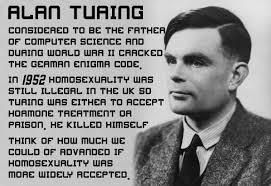Alan Turing : héros du film "Imitation Game"
Alan Turing
Alan Turing was born on 23 June, 1912, in London. His father was in the Indian Civil Service and Turing's parents lived in India until his father's retirement in 1926. Turing and his brother stayed with friends and relatives in England. Turing studied mathematics at Cambridge University, and subsequently taught there, working in the burgeoning world of quantum mechanics. It was at Cambridge that he developed the proof which states that automatic computation cannot solve all mathematical problems. This concept, also known as the Turing machine, is considered the basis for the modern theory of computation.
Civil service = l’administration, la fonction publique
Until = jusqu’à
Retirement = la retraite
Relatives = des membres de la famille
Subsequently = par la suite
To teach – I taught – taught = enseigner
Burgeoning = naissant, en plein essor
Quantum mechanics = la mécanique quantique
The proof = la preuve
Computation = calcul, estimation, évaluation
To solve = résoudre
In 1936, Turing went to Princeton University in America, returning to England in 1938. He began to work secretly part-time for the British cryptanalytic department, the Government Code and Cypher School. On the outbreak of war he took up full-time work at its headquarters, Bletchley Park. Here he played a vital role in deciphering the messages encrypted by the German Enigma machine, which provided vital intelligence for the Allies. He took the lead in a team that designed a machine known as a bombe that successfully decoded German messages. He became a well-known and rather eccentric figure at Bletchley.
Part-time = à mi-temps
On the outbreak of war = lorsque la guerre éclata
Full-time = à plein temps
Headquarter = le quartier général
To decipher = déchiffrer
Encrypted = crypté
To provide = fournir
Vital intelligence = des renseignements vitaux
To take the lead = prendre la tête, mener
A team = une équipe
After the war, Turing turned his thoughts to the development of a machine that would logically process information. He worked first for the National Physical Laboratory (1945-1948). His plans were dismissed by his colleagues and the lab lost out on being the first to design a digital computer. It is thought that Turing's blueprint would have secured them the honour, as his machine was capable of computation speeds higher than the others. In 1949, he went to Manchester University where he directed the computing laboratory and developed a body of work that helped to form the basis for the field of artificial intelligence. In 1951 he was elected a fellow of the Royal Society. In 1952, Turing was arrested and tried for homosexuality, then a criminal offence. To avoid prison, he accepted injections of oestrogen for a year, which were intended to neutralise his libido. In that era, homosexuals were considered a security risk as they were open to blackmail. Turing's security clearance was withdrawn, meaning he could no longer work for GCHQ, the post-war successor to Bletchley Park. He committed suicide on 7 June, 1954.
To process information = traiter l’information
To dismiss = destituer, casser
To lose out = y perdre
Blueprint = le plan/ projet
Speed = vitesse
The field of = le domaine de
A fellow = un membre
To be tried = être jugé
Then = alors, à ce moment là
To avoid = éviter
In that era = en ce temps-là
To be open to = être ouvert à
Blackmail = le chantage
Security clearance = autorisation officielle accordée par les services de sécurité
To withdraw = retirer, enlever
Alan Turing was born on 23 June, 1912, in London. His father was in the Indian Civil Service and Turing's parents lived in India until his father's retirement in 1926. Turing and his brother stayed
Le musée "Bletchley Park" est ouvert aux visites pour les amateurs!

/image%2F1036343%2F20140708%2Fob_30eacb_img-0417.JPG)

/http%3A%2F%2Fwww.bletchleypark.org.uk%2Fdoc%2Fimage.rhtm%2FBPHeritageWebS_1.jpg)



Commenter cet article